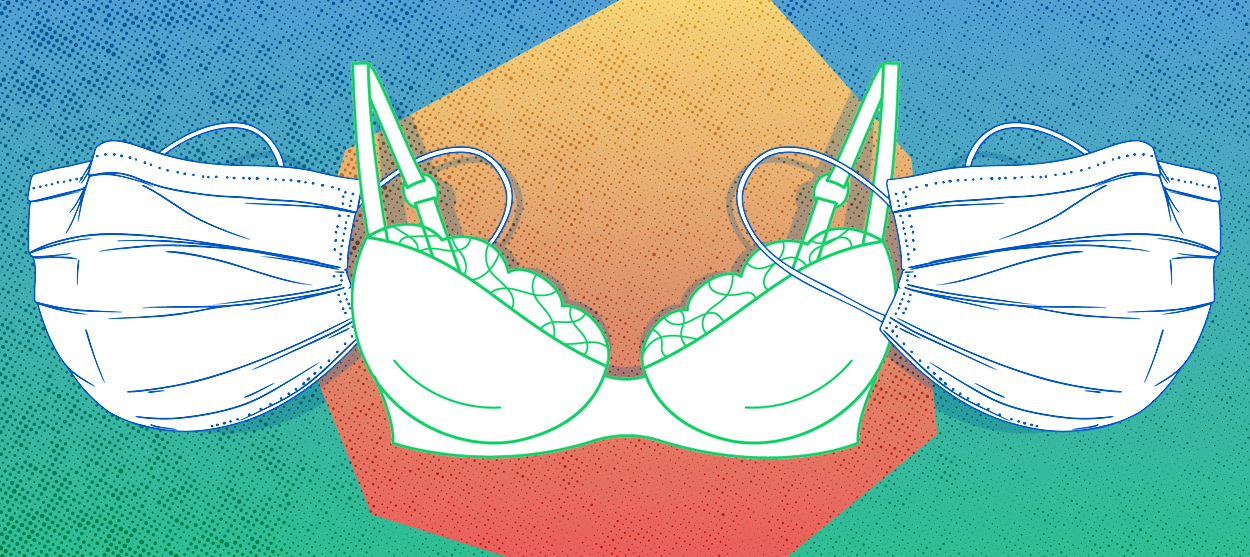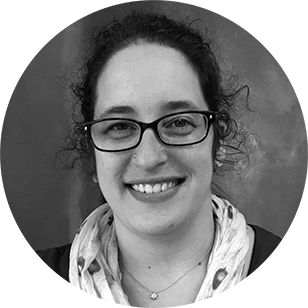What America's mask debate reveals about privilege
Who really gets to be comfortable in this country?


A free daily email with the biggest news stories of the day – and the best features from TheWeek.com
You are now subscribed
Your newsletter sign-up was successful
The other day, my husband returned home from an errand. I heard the water running as he soaped and scrubbed his hands, and then a sigh of relief as he peeled his mask off his face. It surprised me, that sigh; it felt familiar, but not coming from him. I could tell exactly where it bubbled up from in his body, how it felt escaping his lips. "You know," I mused aloud, "this is probably the closest you'll ever get to feeling what it's like to take off an underwire bra at the end of a long day."
He considered for a second. "You're probably right," he said.
I'm hardly the first to have made the comparison between face masks and bras. But there's a flippancy to many of the memes I've seen on the subject, and I don't think the comparison is flip at all. We're currently engulfed in a national culture war over personal comfort versus community good. And this debate has magnified a much deeper and more urgent question: In America, who really gets to be comfortable in day-to-day life?
The Week
Escape your echo chamber. Get the facts behind the news, plus analysis from multiple perspectives.

Sign up for The Week's Free Newsletters
From our morning news briefing to a weekly Good News Newsletter, get the best of The Week delivered directly to your inbox.
From our morning news briefing to a weekly Good News Newsletter, get the best of The Week delivered directly to your inbox.
There's no denying that masks — particularly homemade cloth ones — are not comfortable. Straps pull and chafe; cloth sticks to lips and makes it harder to draw full breaths; the condensation from breath fogs glasses. There's social discomfort, too, the difficulty of reading facial expressions and understanding speech. And underneath it all, there's the unease of knowing why we wear masks: the deadly virus lurking in our communities, and the knowledge that our lives will never be quite the same again.
For those of us playing in the sandbox of women's fashion, there's a baseline level of unease that comes unthinkingly, unquestioningly, with the territory. As a woman with breasts that are large enough to be considered vulgar if not visibly buttressed, I haven't set foot in public without wearing some form of bra since I was about 10 years old. In that time, I've been repeatedly blistered, bruised, and rubbed raw by my own undergarments. It's not just bras, either; I've developed skin allergies from wearing department-store jewelry, and my feet are covered with scars and scabs from where my shoes have drawn blood. Not to mention, I've absorbed a healthy dose of body-image insecurities packaged along with my clothes.
When I talk to my friends who wear feminine clothing, we swap similar stories. This stuff is part of the fabric of our daily lives, to be quietly borne as we go about our business. This is not to say that masculine clothing can't be uncomfortable, or that men can't be insecure about their bodies. But for those of us accustomed to the rules of women's fashion, enduring discomfort for the sake of propriety is nothing new.
I could stop here. It's easy to say, "If I can wear a bra, you can wear a mask." And there's a kernel of truth in that. Absorbing a certain level of physical and emotional discomfort for the sake of others is not only possible, but incredibly common.
A free daily email with the biggest news stories of the day – and the best features from TheWeek.com
But there are wrinkles in this line of thinking. For one thing, we must be rigorous in distinguishing "discomfort" from "hardship." For some people — including those with respiratory illnesses or sensory sensitivities — mask-wearing can pose a genuine risk to health and well-being. And though many people with hearing loss can wear masks just fine, they run into challenges communicating with others whose lips are obscured and voices are muffled. At the same time, Americans who would simply rather not wear masks have co-opted the language of disability and accommodation, insisting that their physical discomfort rises to the level of a legally-protected status. These things are not equivalent, and we cannot treat them as such.
We also can't stop at gender when thinking about masks and discomfort. After all, there are plenty of women as well as men refusing to wear masks. But there is another characteristic that these mask-rejecting scene-makers share: They are overwhelmingly white. And that's telling, because whiteness in America — like maleness, or being abled, or so many other flavors of privilege — confers a certain level of day-to-day ease, a carelessness that is as comfortable as old pajamas.
Here, again, privilege rears its sticky head. To be comfortable in America — to feel safe and at-ease in one's own skin, to have one's needs and desires amply met, to be able to avoid experiences that are distressing or unpleasant — is, in many ways, dependent on our place in an oppressive system. Not everyone is able to get comfortable in the same way. Our identities intersect and interact differently. But privilege is seductive, and we are comfort-seeking creatures.
Thus far, 2020 has been all about stripping away the trappings of American comfort with shocking speed. That's genuinely frightening. For those of us accustomed to the comforts of privilege in its various forms, the question now is what to do with our wounded feelings of entitlement and complacency. When the daily ease we took for granted — like going out in public with bare faces — is now complicated and bitter, how do we move forward? Do we cling to semblances of a comfortable existence that no longer exists? Or do we learn to metabolize these new discomforts and push on anyway?
Wearing masks in public is an exercise in physical discomfort, yes; but it's also about the emotional discomfort of feeling our cushioned foundations dissolving under our feet. When I find myself comparing masks to bras, I'm not just thinking of the lines left in my skin by cloth and elastic pulled taut. I'm thinking of how we practice the ability to absorb and digest discomfort in all its forms.
Want more essential commentary and analysis like this delivered straight to your inbox? Sign up for The Week's "Today's best articles" newsletter here.
Zoe Fenson is a freelance writer based in the San Francisco Bay Area. Her writing has appeared in Longreads, Narratively, The New Republic, and elsewhere. When she's not writing, you'll find her doing crossword puzzles in cocktail bars or playing fetch with her cat.
-
 Tourangelle-style pork with prunes recipe
Tourangelle-style pork with prunes recipeThe Week Recommends This traditional, rustic dish is a French classic
-
 The Epstein files: glimpses of a deeply disturbing world
The Epstein files: glimpses of a deeply disturbing worldIn the Spotlight Trove of released documents paint a picture of depravity and privilege in which men hold the cards, and women are powerless or peripheral
-
 Jeff Bezos: cutting the legs off The Washington Post
Jeff Bezos: cutting the legs off The Washington PostIn the Spotlight A stalwart of American journalism is a shadow of itself after swingeing cuts by its billionaire owner
